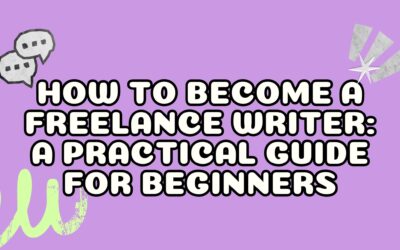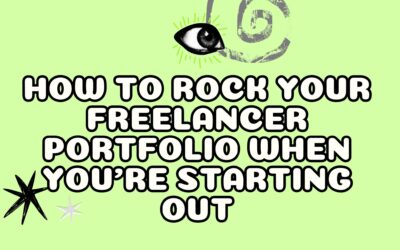Psssttt...

Ready to find high-paying clients and build a profitable business?
Get your free copy of Win More Clients, a 20+ page eBook that shows you how to get paid more and the secret sauce you need to create a sustainable freelance business
Here’s the deal. You’re a new freelancer. You want to write for a living, but you have no idea where to start. But, you think, you’ll figure out how to get the wheels in motion once you start earning some money.
So you research until you’ve scoured Google dry and come to the conclusion that there’s just one thing to do: hit up some freelance job boards.
I feel you.
I was in the same position as you at the start of my career. Heck, EVERY freelancer is in the same position as you. No one starts with any clients. We all start from square one try to find our first freelance writing job, and freelance job boards are a great place to start.
We’ll talk a bit more about that in a minute.

First of all, I want to share my story about using job boards with you, just to give you an idea of how well they can work – if used sparingly and with a decent strategy.
My Story of Using Freelance Job Boards
If you’re a regular reader, you know that I started my freelance career with just one month to get myself together before I moved to Spain.
At the time, I knew I needed to build the foundations of my freelance business in order for it to be a success, but I also knew I needed to get some income quickly.
So I hit up the freelance job boards.
Like, all of the freelance job boards (I’ll list a few further down).
Each day I searched and searched and searched Google for more boards with jobs and made myself apply to at least five different openings that matched my niche and expertise (travel writing and blogging at the time).
I applied and applied and applied (seriously, it’s all about getting the numbers up in the early days, for practice’s sake, and for the rule of probability), and then finally I had my first bite.
Guess which freelance job board it was from?
Craigslist. Yes, you heard that right. Loads of people will tell you to avoid sites like Craigslist with a barge pole, but I’m going to show you how you can leverage them to your favour.
So, the company was a high-end luxury hotel middleman and they wanted a writer to create prose-y hotel descriptions.
I initially shot off an email detailing my experience (I had started my own travel blog and worked in the travel industry) and attached my CV.
I thought nothing of it because, well, I hadn’t heard back from the majority of ads I’d sent applications into, so I was shocked (and incredibly excited) when they got back to me 2 weeks later saying they liked my application and could we set up a Skype call.
At this point, I was freaking out because I still had a full-time job, so when was I going to take the Skype call?! I thought that would be the end of me being in the running for the position, but they worked around my timeframes and we managed to have a chat.
A week later I did a trial piece for them, and a week after that they hired me in an on-going gig. In that first month from that gig, I pulled in $1,000, which was exactly what I needed to kickstart my business – plus, it was a recurring little number, so I knew I’d have at least some income coming in each month.
Let’s talk about you now, and freelance job boards in general.

Should You Use Job Boards?
I’m a big believer that the key to a successful business is laying solid foundations and creating a brand of your own so you don’t have to rely on the dip and rise of job boards and other people.
However, freelance job boards are great when you’re starting out and if you need a little boost in your weekly marketing schedule.
Some of the reasons they’re good:
- They advertise jobs that are open (a.k.a. companies that are actively looking for freelancers, so you know you’re not pitching them in the dark)
- You can find all sorts of jobs in all sorts of niches on them
- You can schedule a session each week to boost your leads
So, yes, freelance job boards can be awesome for getting some quick clients on board, especially when you haven’t established yourself or got yourself up and running properly, but there are a few things you should consider before you dive in headfirst.
1. Don’t Rely On Them
Freelance job boards shouldn’t be your only marketing strategy (download the checklist below to learn 20 more ways you can kick-start and grow your business today if you’re stuck for other ideas).
Sometimes you’ll find that they don’t have any new, relevant jobs for days, or you’ll go through a period of getting zero replies.
It happens, don’t kick yourself. But do prepare yourself. The best marketing mix features several different techniques – so, while freelance job boards might be a good tactic to arm yourself with, make sure it’s not your only one.
2. Find Ones That Regularly Promote Jobs in Your Niche
There’s no point scouring a job board every day that rarely offers the goods you’re after.
In the early stages, make a note of the jobs boards you consistently find good ads on and pare back your list to just include those after a while.
When I started, I was all over the shop checking job boards in every corner of the internet every single day. But now? Now I’ll check the ProBlogger job board once or twice a week and be done with it.
Why? Because that’s the site I’ve consistently found good jobs in my niche on. I spent time browsing others but found that I was wasting time rather than landing work.
You’re probably shouting at the screen by now: “Hey Lizzie! Just give me some freelance job boards already!” Here you go:
5 of the Best Reputable Freelance Writing Job Boards
* Some links are affiliate links, which means I get a small commission if you sign up at no extra cost to you. I will only ever share tools and companies I completely believe in with you.
How to Tell a Good Ad From the Bad
The biggest problem with freelance job boards is the quality of job can sometimes be, well, grim.
Some days, there’ll be a glut of well-paying gigs at dreamy companies, and the next there’ll be someone trying to get something for nothing.
So how can you tell what’s a good ad and what’s not?
Good ads are lengthy, they know what they want, and they definitely DON’T ask for free work
The easiest way to tell if a job is going to be legit is by how long the description is. A two-sentence blurb stating that the poster wants “a quick writer with cheap prices” isn’t going to fill you with hope, right?
A good ad will describe what the job involves and the qualifications and skills of the freelance they’re looking for. It should also name the company and offer a price range (though sometimes you’ll be asked to pitch a price, which is fine).

An example of a GOOD job ad
Good companies who are good to work for know what they want, and they aren’t afraid to spell it out so they can separate the wheat from the chaff.
Now you’re at the point where you’ve found a couple of job ads that look right up your street. So how do you make sure you have a chance at getting an interview or being hired?
What to Include in Your Application
Applications for freelance job boards are a big bane of many freelancer’s lives. Sometimes, it feels like you need to send off something perfect to stand out amongst the competition and, while you do need to show off your skills and tell them why you’re the person for the job, don’t freeze up because you’re worried you won’t stand out.
Instead, MAKE yourself stand out. And remember, the quicker you get that application in, the quicker they will get back to you.
How do I know this? Because I put an add on a job board once and received hundreds of replies. The ones I replied to were within the first 20 applications. After that? I hate to say it, but I didn’t read them. There were too many, and I’d already found a few people who were a good fit in those first 20.
1. Personalise it if possible
This means using a first name if you can or at least saying something like “Hi there” rather than “Dear Sir/Madam.” Try to personalise it slightly to the job, too. If the ad mentions the company, drop that in.
2. An introductory sentence
The key to creating a great application for freelance job boards if to be precise and to the point. Dive in right away and, whatever you do, don’t ramble! Here’s my opening sentence:
Professional business copywriter, blogger, and digital marketing pro here.
This shows what kind of freelancer I am and where my expertise lies straight off the bat.
3. How you can help them
The biggest mistake a lot of freelancers make in applications is talking solely about themselves. If you want to stand out, you need to relate everything back to the position and how you can help the company.
Do you love writing about cars? Try “I love writing about cars, and I have in-depth knowledge on all the latest releases which I can weave into my pieces to build your authority.”
Once you’ve completed your application, read through it and make sure there are at least 2 places where you mention how your skills can help the company.
4. Samples
Most job ads will ask for samples – usually between 3 and 5. When you’re considering which samples to add, instead of sending off your latest, include the ones that are most relevant, even if they’re not on the same topic.
For example, a piece about luxury cars might be a good sample to send off to a company focusing on luxury holidays because they both target luxury markets.
If you don’t have any samples, don’t worry! Here’s a post all about how you can get some pieces together when you’re just starting out.
5. The answer to any questions they ask
Finally, read the ad carefully to see if they’re asking any specific questions and, if they do, make sure you answer them in your application.
If you stick to these tips, your applications to freelance job boards should stand out amongst the crowd.
When I put an ad up, I was amazed by how many applications were generic and made it obvious they just hadn’t read the ad. As long as you can do this, and relate your skills to the position, you stand an awesome chance at getting hired.
Looking for other ways to market your services? I’ve got you covered. Download the free 20 Ways to Grow Your Freelance Biz checklist right now!







I actually applied for that Mediakix job because it seemed so well-written! I read another one that stated ‘intermediate English’ was a must…but apparently that condition didn’t cover the job ad itself. I still have no idea what they were actually looking for.
I apply for three jobs a week (as a minimum) on ProBlogger, mainly because I’m still in my day job and I’m trying to spend more time building up my portfolio and networking on Twitter so I can hopefully cold pitch clients (terrifying!!) rather than using job boards. But I did have one company get back to me and ask me to write a test post so my pitch email must be alright!
Yes, it’s a great ad, right! So glad you applied for it and good luck 🙂
I love that you’re consistent with how many jobs you apply for. It doesn’t really matter how many you go for, as long as you keep it up and persevere – which you are! Ah cold pitching is terrifying to begin with, but when you start getting responses that are positive, things get so much easier.
Awesome tips Lizzie (as usual).
I started with job boards and love them! You can land some good gigs right off the bat too. ProBlogger is awesome but I landed my first gig over at FreelanceWriting.com 🙂
Elna Cain | Freelance Writer recently posted…How to Improve Your Samples as a New Freelance Writer
Thanks so much, Elna!
Yes, I’ve pitched to ads on FreelanceWriting.com many a time, too. Job boards are great for getting quick work that can pay really well!
Thanks for this post, Lizzie. You’ve inspired me to check out jobs boards – including CraigsList.
So glad I inspired you, Kate! Let me know how you get on.